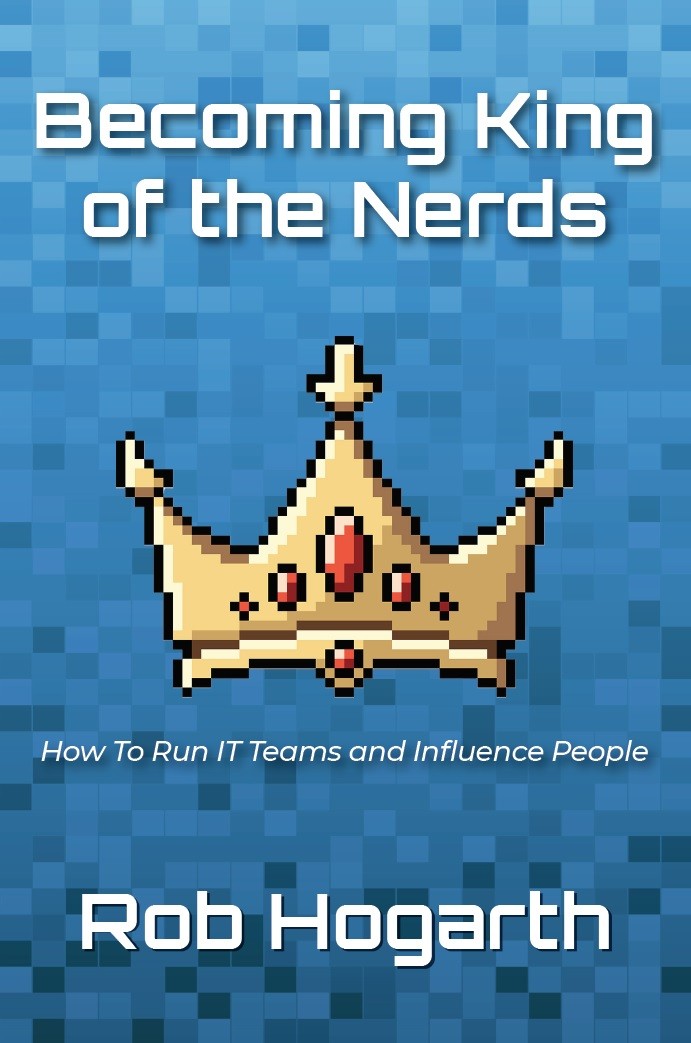
The IT Department's Core Problem
I’m going to propose a fundamental problem that all IT people will relate to, but most won’t comprehend the implication of it.
People don’t understand what “IT” does
There’s a second follow on fundamental problem:
Most people don’t care what “IT” does as long as it just “works”
Those two concepts are the core of every challenge in IT today.
No matter how great you are, most people you work with and know don’t understand what you do and they don’t really care. That’s a tough reality to deal with. But no job is easy, and this is our burden.
Consider the following all too familiar scenario:
- New employee starts on a fresh Monday morning.
- There is a process for new user creation.
- Nobody has followed it.
- You were not made aware of this fact.
- This is not unusual.
- You are approached mid-sip of coffee with a manager and new employee, who both interrogatingly ask:
“Why hasn’t my new employee got a login!”
Before you can swallow your mouthful of coffee to reply, the new employee remarks:
“This is just like IT at my last company they could never get anything right either!”
They both storm off. Hopefully, I haven’t given anyone PTSD flashbacks.
“This is every day in my world”. I can hear you saying.
Unfortunately, it’s far too common. Our response as IT staff is to become defensive:
“There’s a procedure to get new accounts!”
Of course, there is. It’s probably a great one, well thought out, well implemented, and properly communicated to the office.
At lunchtime we get derisive:
“That new employee doesn’t even do anything important, and we dropped everything to get her set up!”
Most likely this is where we end up. Everyone is unhappy.
The company doesn’t value you. It doesn’t understand why you developed a process and will never follow it. You never feel respected or feel like you are contributing at your capacity. Ultimately the stalemate continues until you leave.
People don’t understand what IT does, and most people don’t care as long as IT just “works”
This is the biggest problem you will face, and the biggest challenge you need to overcome.
Part of this issue stems from a complete lack of understanding of just what corporate IT teams do.
We inherently have a picture of what people in companies do based on our own experiences. We have a picture of salespeople as outgoing Type As in suits, sleazy used car salespeople, or the tired door-to-door salesman travelling around selling his wares.
Whether you envisage poor old Gil Gunderson from the Simpsons or Alec Baldwin from Glen Garry Glen Ross, we all have some idea of what a salesperson does. Even if our idea isn’t entirely correct.
Same thing for the finance team, we pay our bills and do taxes, so we may feel corporate finance is inherently like our own experience, but company bills are larger, and they probably pay LESS tax with some smart accounting tricks unbeknown to us.
This reasoning is obviously incomplete but good enough to give us some idea of the skills, tools and abilities required for each role.
“Oh, I’m not outgoing enough to be in sales” “I just don’t have the numbers for finance!”
Some of these fields are easy to view and understand. Old Gil is a terrible salesperson because he doesn’t sell things. Alec Baldwin was selling lots of houses and drove a great car. You either sell lots of things and are great or sell nothing and are terrible.
Likewise, if you’re in accounts payable and never pay anyone, you are probably not doing things right.
But this doesn’t translate to every field. We all have been in positions where we are quite critical of our CEO/General Manager. They never do any REAL work. They are never in the office. They are overpaid and under-qualified. For some CEOs that may be an entirely valid criticism. But a lot of people don’t have an appreciation for what a CEO actually does every day. WE get a little older and start to have our own teams, or our own family that we are responsible for, and start to get an appreciation for it.
Running a company can be a real tough job. You have the ultimate responsibility for millions of dollars or hundreds of millions or even more. 1000s of people can rely on them for their very livelihood. Those times they show up seemingly late probably hide the early morning meetings they had after the work-related dinner that they presented at. The food is great, but there’s some long hours and speeches and discussions that can easily sway a whole business very quickly. Swings and roundabouts as they say.
We start off in our teenage years seeing bosses being portrayed as entitled, layabouts, earning the big bucks and having the high life. We see the Mr Burns’, the Michael Scott’s and the Bill Lindbergh’s of the world. They exist in a black and white world of corporate greed, employee indifference and entitlements. Hopefully, as we grow up a little and see the Dr Perry Cox’s and the Captain Raymond Holt’s and the Sherman T Potter’s. They exist in a grey world, where things are never just right or wrong. The Jean-Luc Picard, the greatest Captain of them all (…you heard me…) said it best:
It is possible to commit no mistakes and still lose. That is not a weakness… that is life.
If we apply this to IT teams, we can see parallels. The most obvious is that a naive view of IT is that it’s just like fixing an iPad at home. Or if someone is super adventurous, building a PC from parts they bought at a PC store, case + motherboard + CPU + PSU = ultimate gaming PC.
As IT professionals, we scoff and laugh. Building PCs is nothing like what we do. Of course, this is true, we buy computers 50 at a time from Dell, or rack 1ru rack mount “pizza box” servers like they are indeed pizzas. We know, IT is far more than simply desktop hardware. Its more than just clicking next next next in an install wizard, or having a recording that declares “Hello IT, have you tried turning it on and off again”.
But the great reality is, nobody will ever understand the scope, detail, care and forethought that goes into running a successful IT team unless we as leaders are the ones who help to identify this.
There’s also definitely an art to this. I might be super excited that I’ve fixed a very difficult issue that’s taken me days to resolve. On a high in the break room, I go to explain what I did, but get glazed eyes and a complete lack of understanding. Especially from senior managers. They might get bored quite easily at an intricate technical explanation.
Maybe our colleagues can humour us a little and be happy for our success without understanding it.
However, what if the problem I solved can boil down to “I fixed a problem with increasing redundancy (…boring so far), which prevented us having downtime (…ok I get that bit) which saves us $100,000 per hour in the event of a power outage”. OK, now you’ve got someone’s attention.
However, giving people an appreciation of the scope of IT teams is one thing. The real issue here is more than just understanding why IT is important.
There’s a certain level of entitlement and trust that can go with an IT team. The late-night work, the weekend changes, the out of office upgrades, that means a lot of the time we are rolling into work late in the morning with the CEO, hours after everyone else has arrived. Or we are out of the office on training, or speaking, or working with a vendor. All legitimate excuses for being out of the office.
But what do those other teams around us think? Do we even let them know why we were in late? Most likely because we were up late making sure systems were going to be working smoothly for them.
This can be an epic source of contention in the office. We work hard, sacrificing our late nights and weekends. But our users just see the half days, the early marks, and the seemingly random approach to being in the office. After all of this, the IT team get praised for their good work? They are hardly ever here!
If you want to be a successful IT manager and above, you need to understand these issues. But more than that if you want to be successful in IT full stop, you need to start to understand and embrace these challenges.

Break down the walls, start building bridges.
Or in other words, if you want some respect and understanding, you might need to be the person and team to start giving some of those things out.
This is an excerpt from Becoming King of the Nerds: How to Run IT Teams and Influence People
Grab the eBook or paperback for more great tips and wisdom. All the really good stuff you have to pay for.
Available from Amazon at: https://amzn.to/3wsjFgi
